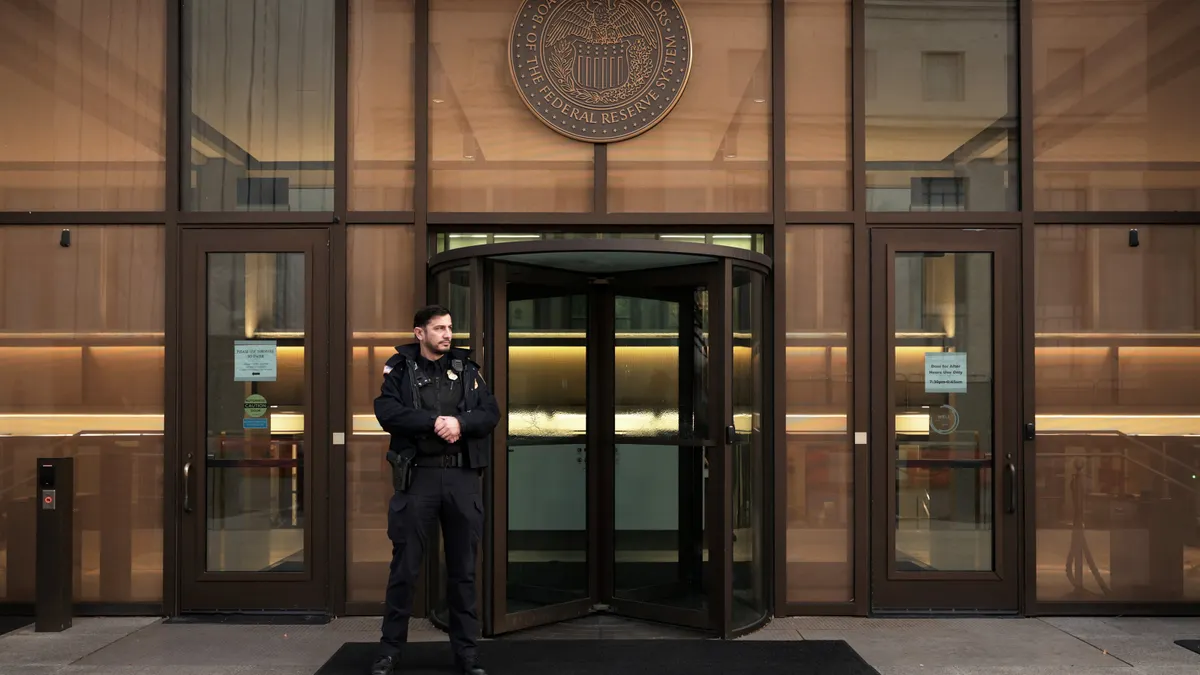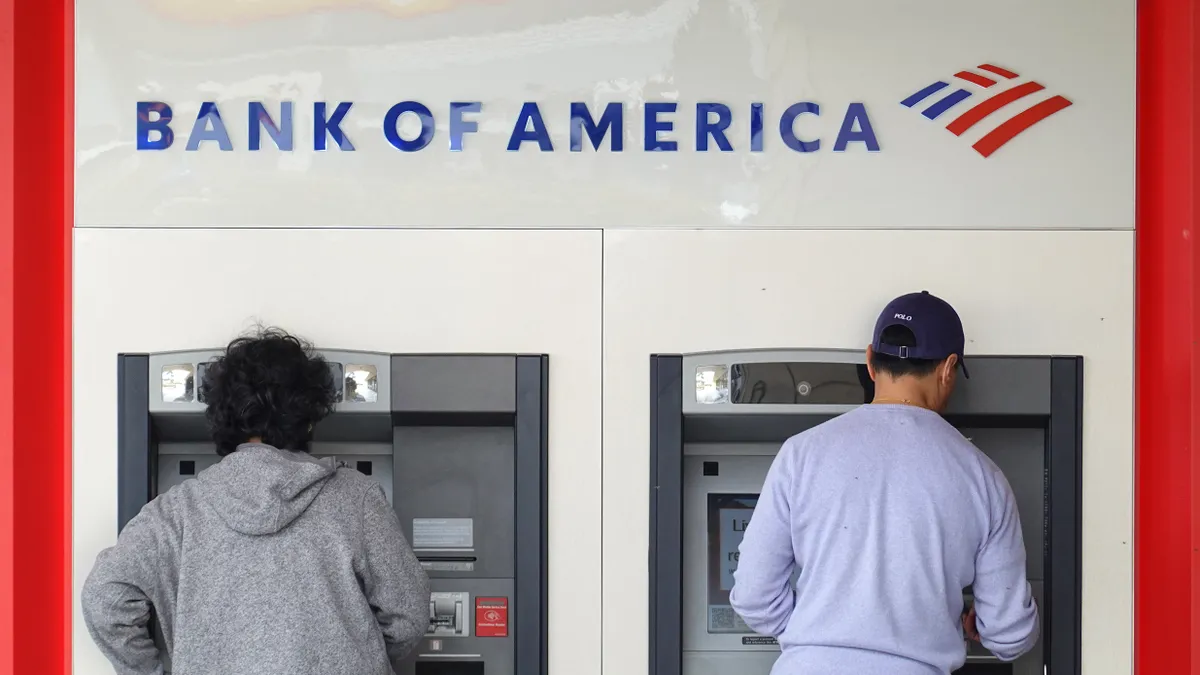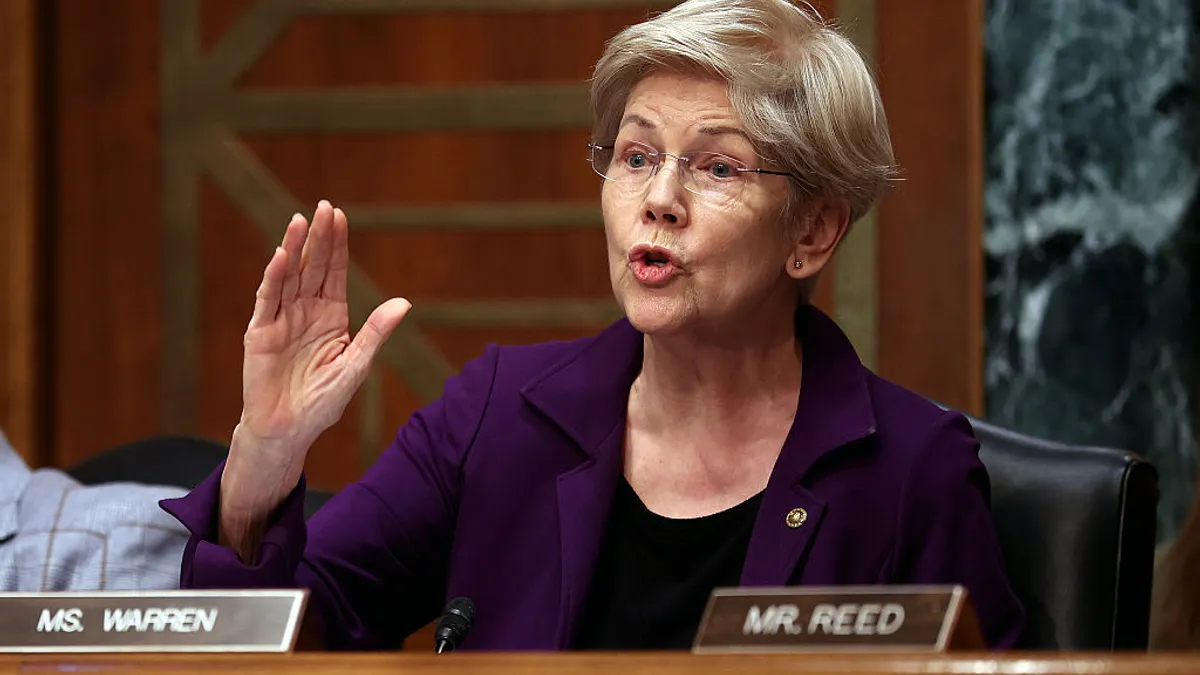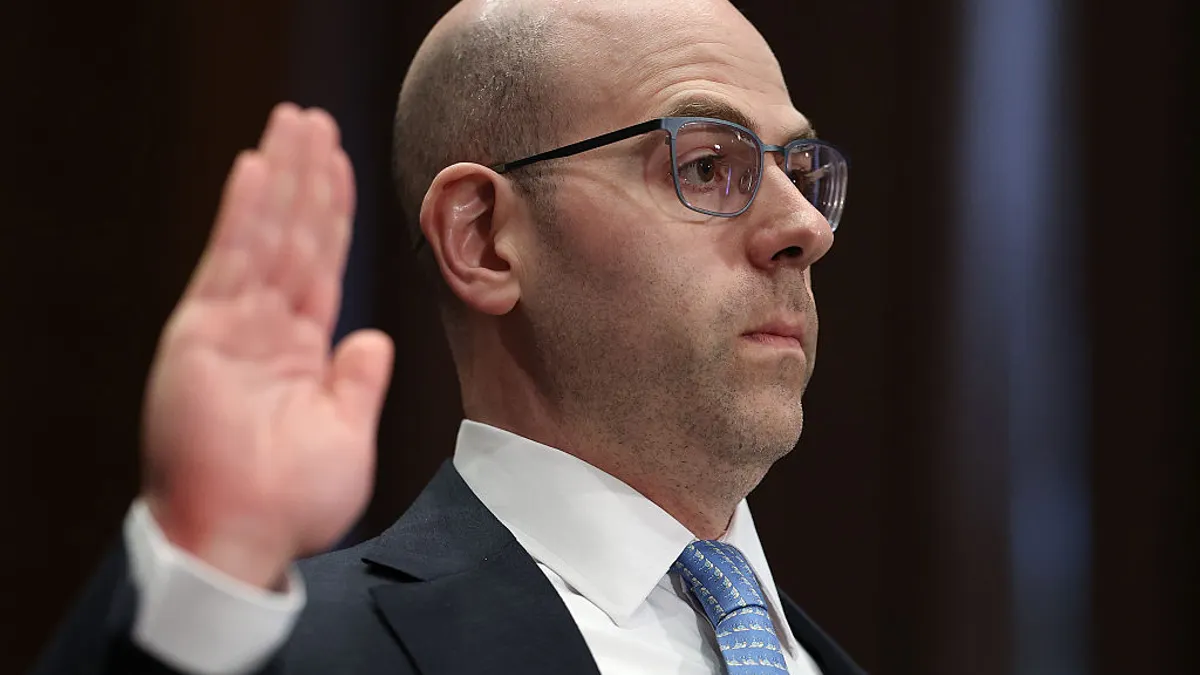The Consumer Financial Protection Bureau proposed two rules for publication Thursday in the Federal Register: one arguably weakening fair-lending laws, and the other following through on a promise to revamp small-business data collection guidance that irked Republican lawmakers and drew a lawsuit and at least two enforcement delays.
The week’s boldest CFPB-related move, though, may have come from the Justice Department’s Office of Legal Counsel, which told CFPB Acting Director Russ Vought in a memo that the bureau may not legally request funds at this time from the Federal Reserve under the Dodd-Frank Act.
The memo was submitted Monday to the U.S. District Court for the District of Columbia, as part of a long-running case involving the bureau’s sporadic attempts to decimate its own workforce.
Monday’s filing was meant to alert the court of a “potential lapse in appropriations” to pay the bureau’s operating expenses.
The CFPB “anticipates exhausting its currently available funds in early 2026,” DOJ attorneys told the court.
In its memo, the OLC argues the CFPB’s funding procedure is unlawful under an interpretation of the term “combined earnings,” as used in Dodd-Frank.
By its logic, the OLC equates earnings – from which the Fed can derive the CFPB’s operating budget – with profits, rather than revenues. However, the Fed has operated at a loss since 2022.
“If the Federal Reserve has no profits, it cannot transfer money to the CFPB,” T. Elliot Gaiser, the assistant attorney general who leads the OLC, wrote to Vought.
The irony is, Vought, since February, has consistently refused funding for the CFPB from the Fed.
Gaiser is not the first financial mind to interpret Dodd-Frank as tying CFPB funding to Fed profit. Insights published by The Wall Street Journal, The Federalist Society and the American Enterprise Institute have theorized much the same – especially since the Supreme Court last year upheld the CFPB’s funding structure.
In a statement Tuesday, Sen. Elizabeth Warren, D-MA – the architect of the CFPB and ranking member of the Senate Banking Committee – blamed Vought.
“This absurd maneuver by Russ Vought is plainly illegal, and federal judges have already rejected his fringe theory,” Warren wrote. “If the courts continue to uphold the law, Vought will fail again.”
Vought laid bare his aim to “put [the CFPB] out … within the next two, three months” in an October appearance on “The Charlie Kirk Show.”
“We don’t have anyone working there except our Republican appointees and a few career [employees] that are doing statutory responsibilities while we close down the agency,” he said at the time.
Only Congress can abolish the CFPB. However, under President Donald Trump’s “big, beautiful bill,” lawmakers cut nearly in half the ceiling on the CFPB’s operating budget – from a cap of 12% of the Fed’s operating expenses, to 6.5% at most.
“The Bureau does not know whether and the extent to which Congress will appropriate funding to pay the expenses of the Bureau," Brett Shumate, an assistant attorney with the DOJ's civil division, wrote in Monday’s filing.
It is unclear how Wednesday’s end to the government shutdown may affect the CFPB’s narrative here.
Vought plans to prepare a report to Trump and to congressional appropriations committees identifying the "funding needs of the Bureau," the DOJ noted.
In a rare post on its website Tuesday, the CFPB noted that the opinions of the OLC “are binding upon Executive Branch agencies including the Bureau.”
‘Outright assault’
Separately Thursday, the CFPB proposed tightening the standards that dictate when it can punish lenders that discourage certain borrowers from seeking loans. The move, aimed at eliminating efforts to fight unintentional bias, would also restrict companies from using race, gender, national origin or other protected classes in “special purpose credit programs” meant to increase lending.
The proposal comes months after Trump issued an executive order preventing agencies from using disparate impact as a barometer for discrimination.
Jesse Van Tol, CEO of the National Community Reinvestment Coalition, called the proposal "an outright assault on civil rights in lending."
"By gutting disparate impact analysis and banning race- or gender-based Special Purpose Credit Programs, this rule will effectively invite a return to redlining and exclusion," Van Tol said in a statement Wednesday.
Observers have noted that disparate impact can still be addressed at the state level.
As for the tweaks to lending “discouragement” policy, the CFPB proposed Thursday that only language explicitly stating that a lender won’t provide credit to specific gender, racial or ethnic group, or other protected class, would be considered discouragement under the Equal Credit Opportunity Act.
That may be seen as a response to actions that past iterations of the CFPB took against Townstone Financial, for example. The co-founder of that Chicago-area mortgage lender landed in hot water when the CFPB found he discouraged borrowers through racist statements about Black neighborhoods during appearances on radio shows and podcasts.
The CFPB, historically, has alleged lenders improperly discouraged certain groups by failing to advertise in publications read by borrowers of color.
The proposal is open for public comment through Dec. 15.
Small-business data collection
Also on Thursday, the CFPB extended until January 2028 the deadline for compliance with a contentious rule requiring that lenders collect certain data from small-business borrowers.
The original rule, finalized in March 2023, touched off a flurry of litigation, including a lawsuit from a Texas bank and the state’s banking trade group. The judge in the case paused the rule nationwide but rejected the lawsuit after the Supreme Court upheld the CFPB’s funding structure.
The substance of the rule raised the rancor of some Republican lawmakers, citing regulatory overreach and potential privacy violations.
Sen. John Kennedy, R-LA, in October 2023, said the rule “totally perverts [the] intention … of the Dodd-Frank Act.”
Section 1071 of the act required 13 pieces of information to be collected from borrowers. But the CFPB’s rule, circa 2023, expanded that number to 81.
“All of a sudden, they want a book,” Kennedy said. “They’re going to publish it on their website: Are you gay? Are you lesbian? What race are you? … And snoops will be able to go on that website and identify small business people in their community.”
Thursday’s proposal narrows the data collection back to 13 pieces, and scraps the requirement that lenders identify the small-business owners by race, ethnicity and LGBTQ+ status. The proposal also amends the definition of a small business to focus on companies with up to $5 million in gross annual revenue, rather than an initial $1 million threshold. It also exempts lenders from reporting requirements unless they make 1,000 small-business loans per year – a significant uptick from the 100-loan threshold the CFPB laid out in 2023.
Further, merchant cash advances, small-dollar business credit and agricultural lending, among other categories, are now excluded from the loan tally.
The Texas Bankers Association, a plaintiff in the 2023 case, credited Vought on Wednesday for taking “a common-sense step.”
The CFPB vowed in April to revamp the rule, citing ongoing litigation – and further promised not to enforce it. The bureau later delayed the compliance timeline before the first tier of lenders would have had to begin collecting data.
Like the CFPB’s other Thursday entry, the proposal is open for public comment through Dec. 15.



















